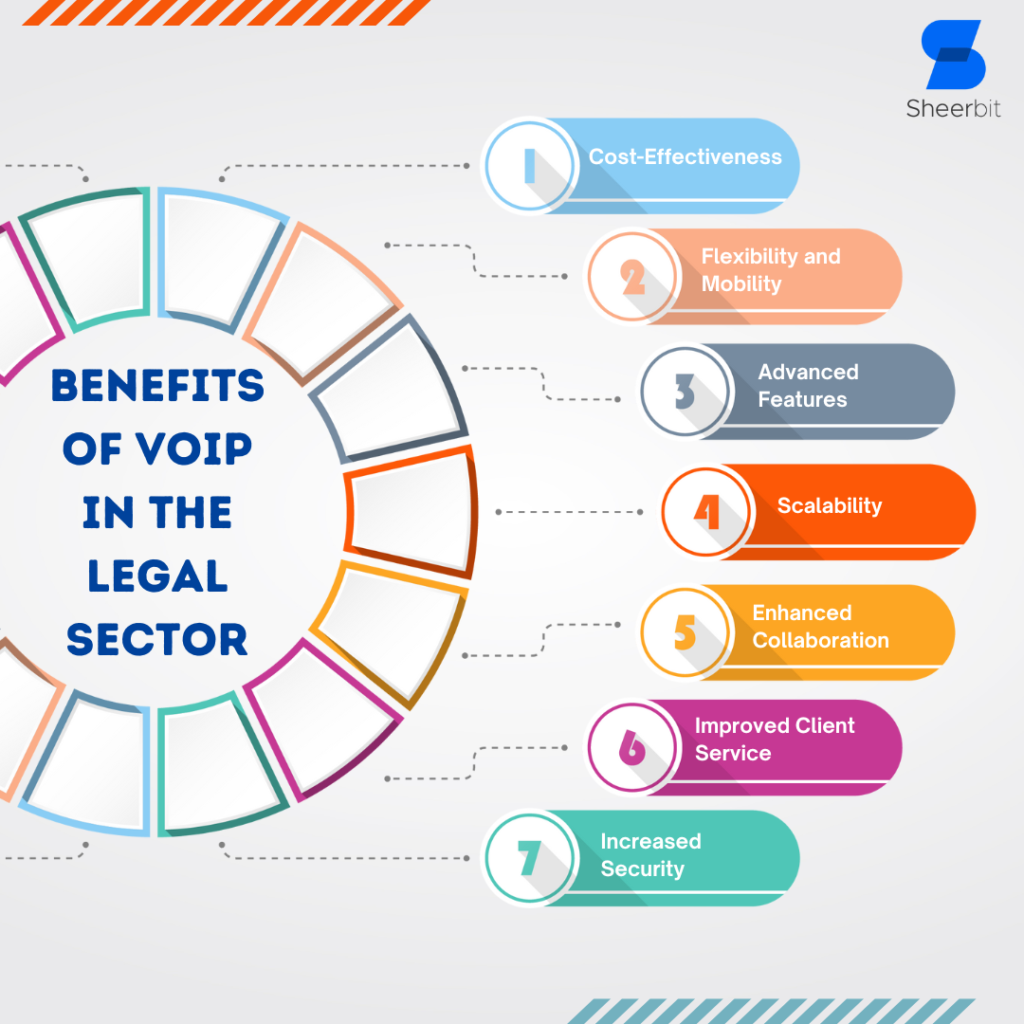Success in the fast-paced legal climate of today depends on efficient communication. Legal businesses always look for ways to increase customer happiness, streamline procedures, and optimize their operations. Voice over Internet Protocol is one piece of technology that has completely changed communication in the legal industry (VoIP). This creative idea has several benefits that can greatly help legal practices of all sizes. Let’s explore VoIP’s advantages and how it might improve communication in the legal sector.

Benefits Of VoIP In the Legal Sector
VoIP technology provides customized solutions to meet the particular communication requirements of the legal industry.
1. Cost-Effectiveness:
VoIP is an affordable option for legal companies, especially those looking to save expenses. VoIP transmits calls via the internet, doing away with the need for expensive infrastructure, in contrast to traditional phone systems that have substantial setup and maintenance expenses. Because of this, it is a desirable choice for small and big legal practices as well as solo practitioners, allowing them to manage resources more effectively.
2. Flexibility and Mobility:
Lawyers must have a flexible and mobile communication solution because they frequently operate remotely or on the go. VoIP fills this demand by allowing legal professionals to make and take calls from any location with an internet connection. VoIP guarantees continuous contact, enabling legal practitioners to be reachable and accommodating whether they’re working from home, attending court proceedings, or visiting clients off-site.
3. Advanced Features:
VoIP systems come with a slew of cutting-edge capabilities designed specifically to cater to the requirements of legal companies. These consist of conference calling, voicemail-to-email transcription, call forwarding, and auto-attendant features. These tools help lawyers handle their communications more effectively and efficiently, which improves productivity, cooperation, and client service inside the business.
4. Scalability:
Law companies’ communication needs develop in tandem with their growth and evolution. Due to VoIP systems’ great scalability, businesses may quickly add or remove users and modify their service plans as needed. VoIP allows legal companies to adapt to changing demands without sustaining significant expenditures or interruptions, whether they are growing their business, adding additional offices, or cutting back on operations.
5. Enhanced Collaboration:
In the legal field, efficient teamwork is essential, especially when working on multidisciplinary cases with groups of attorneys, paralegals, and support personnel. VoIP enables real-time information and idea transmission regardless of physical location or time zone variations by facilitating seamless communication and collaboration through capabilities like instant messaging, video conferencing, and file sharing.
6. Improved Client Service:
For legal companies, offering first-rate customer service is essential to their success. VoIP allows attorneys to stay in regular contact with their clients, answer their questions quickly, and provide updates on how their cases are doing. Functions like as call recording and comprehensive call analytics improve accountability and transparency, building client trust and confidence.
7. Increased Security:
In the legal field, maintaining the privacy of clients and sensitive data is crucial. VoIP systems have strong security measures to protect communications from cyber threats and unauthorized access, such as encryption and secure protocols. Law companies may guarantee compliance with data protection rules and reduce the risk of breaches by selecting a reliable VoIP service with strict security measures.
Who Benefits from VoIP in the Legal Sector
VoIP technology offers advantages to a range of legal industry players, such as:
Lawyers and Legal Staff:
Take advantage of increased productivity, flexibility in communication, and teamwork, which will help them operate more successfully and efficiently.
Clients:
Get faster answers to your questions, more accessibility to legal experts, and increased transparency all along the legal process.
Law Firm Administrators:
Gain from reduced expenses, more efficient operations, and easier control of the communication infrastructure.
VoIP Disadvantages for the Legal Sector
Dependence on Internet Connection:
VoIP requires a reliable internet link to function. Communication can be disrupted, calls may be lost, and the quality of the conversation may suffer if the internet connection is erratic or sluggish. VoIP deployment may provide difficulties for legal practices located in places with patchy internet access.
Potential for Cybersecurity Risks:
VoIP systems are not impervious to cybersecurity attacks, despite their strong security measures. Legal companies need to guarantee that their VoIP systems are appropriately designed and safeguarded to avert unapproved entry, electronic spying, and security breaches. To reduce the cybersecurity risks connected with VoIP, regular security assessments and upgrades are crucial.
Integration Challenges:
VoIP integration with current software and systems can be challenging, particularly for bigger legal firms with sophisticated IT infrastructures. Compatibility problems and the need for extra resources for a smooth integration may arise for law firms, which might cause delays and higher implementation costs.
Reliance on Service Provider:
Law companies are dependent on the service standards and dependability of third-party VoIP service providers. If the service provider has technical difficulties or outages, it may affect the company’s production and cause communication problems. Legal companies should thoroughly assess potential suppliers and select trustworthy vendors with dependable customer service and uptime.
Conclusion
In conclusion, VoIP technology has a lot to offer legal companies. It helps them communicate more effectively, work together better, and provide better client care. VoIP has drawbacks, however, such as the need for the internet and potential security breaches, but these may be avoided with planning and cautious selection of service providers. Law companies may remain competitive, adjust to changing customer expectations, and succeed more in today’s digital environment by using VoIP.
Ready to experience the benefits of VoIP for your law firm? Contact us right now to find out how VoIP can transform communication in your legal practice. Improve the communication system in your office and take your law business to new heights. Don’t pass up the benefits of VoIP in the legal sector—book a consultation immediately!





